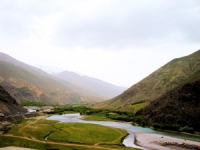Water sharing between Central Asian countries has been conflicting for quite a long time already.
GEF allocates grant for US$12.7m to Uzbekistan

Global Environment Facility (GEF) issued grant for US$12.699 million to Uzbekistan to implement a the Sustainable Agriculture and Climate Change Mitigation Project.
World Bank said that rural communities of over 10 million people in eight regions of Uzbekistan will benefit from the US$12.699 million GEF grant financing for the Sustainable Agriculture and Climate Change Mitigation Project approved by the World Bank’s Board of Executive Directors.
This is complementary financing to the US$120.66 million International Development Association (IDA) credit for the ongoing second phase of the Rural Enterprise Support Project.
The Sustainable Agriculture and Climate Change Mitigation Project will promote the introduction of renewable energy and energy efficiency technologies of relevance to agribusinesses and farms, and strengthen capacity for improving degraded irrigated land and water conservation in Andijan, Bukhara, Jizzak, Kashkadarya, Samarkand, Syrdarya, Tashkent, and Fergana regions.
According to Uzbekistan’s Second National Communication on Climate Change (2010), intensive warming has been observed over the entire country. With further acute water scarcity predicted for extremely warm and dry years, flows in the Syr Darya and Amu Darya Rivers Basins might decrease. The activities envisaged under the new GEF grant would contribute to mitigating and adapting to water scarcity, land degradation, and increased greenhouse gas emission risks.
“The Sustainable Agriculture and Climate Change Mitigation Project responds to the country’s commitment to further reform agricultural sector and raise its importance on the economic agenda,” said Takuya Kamata, World Bank’s Country Manager for Uzbekistan. “The project will help rural communities in Uzbekistan to adopt, transfer, and replicate sustainable agriculture and land management practices aimed at restoring and improving irrigated land, while increasing economic opportunities for the rural population and improving environmental conditions.”
The project components include: Promoting Renewable Energy Technologies (GEF US$9.0 million), Promoting Technologies and Practices to Mitigate Irrigated Land Degradation (GEF US$1.09 million) and Providing Advisory Services and Project Management (GEF US$2.60 million)
Uzbekistan joined the World Bank in 1992. The World Bank’s mission in Uzbekistan is to improve people’s livelihoods through being a partner in economic reforms, supporting the modernization of the country’s social sectors and infrastructure, and sharing its knowledge and experience with the Government and the people of Uzbekistan.
Total current World Bank commitments to Uzbekistan amount to US$894.5 million.




